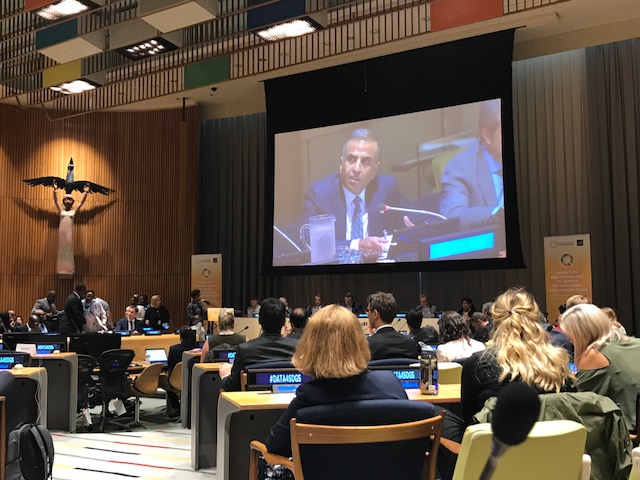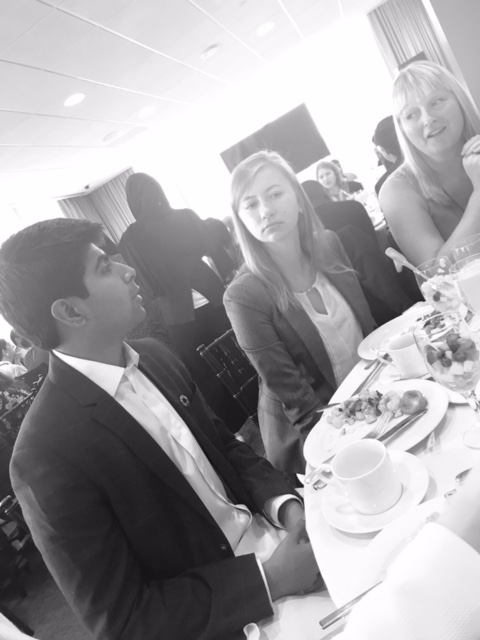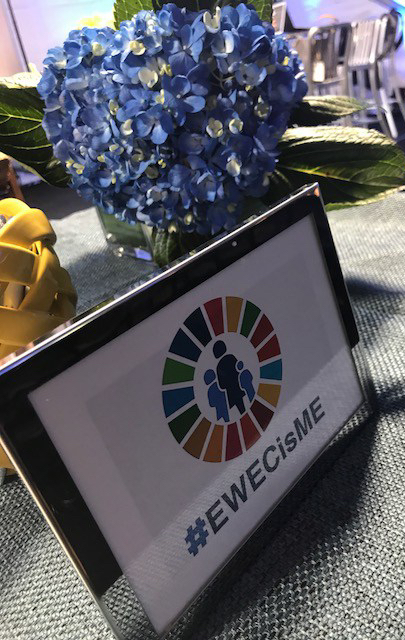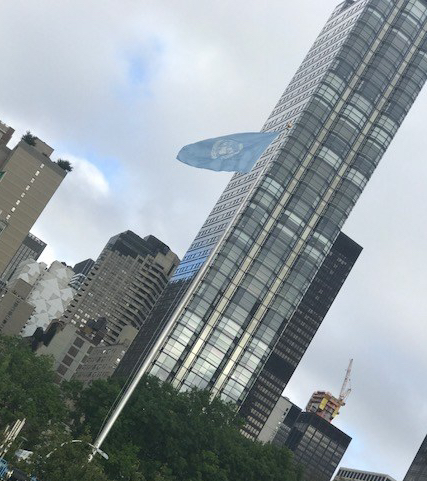The annual General Assembly is like drinking water from a fire hose. There are endless side events, report launches, closed meetings, celebratory receptions and of course the infamous General Debate. This year, more than half of the world’s Heads of State traveled to UN Headquarters in New York City to discuss the most pressing challenges their countries face, what must be tackled together, and reaffirm commitments to global development and humanitarian response.
Every moment must be high-leverage, strategic and seemingly tireless. This even extends to diplomats’ attire, as western suits pale in comparison to the inviting, professional and traditional dress donned by men and women at all levels of diplomacy from across the globe.

The 72nd General Assembly of the United Nations convened at a time of severe natural disasters, economic sanctions against North Korea, the largest number of migrants in recorded history, and ongoing politically-driven conflict. At the core is how UN Member States will coordinate together and with other stakeholders to uphold their commitments to the Sustainable Development Goals, and at the helm is progressive feminist Secretary-General Antonio Guterres (thank goodness).
Below, are take-aways from a civil society perspective through the eyes of a UN Representative familiar to life inside the UN when less of the world is watching.
Press Press Press – It seems this year the press had unprecedented interest in covering the annual dialogues and commitments by nearly 100 Heads of State. It is reasonable to posit that this was largely due to the anticipation of President Trump’s official remarks to the General Assembly given the growing bone of contention with North Korea. As the Trump Administration threatens to cut US funding of the UN as the world’s largest contributor, the media is recognizing the world’s concerns around economic and political stability – especially amidst the pressing issues of global migration and growing food insecurity.
Shrinking Access for Civil Society – It is not new that civil society representatives require secondary badges or meeting passes to gain entry to UN Headquarters during the General Assembly; it must be a heavily secured area given the mass numbers of Heads of State and other high level world leaders. The UN may have the best intentions to ensure civil society access, but the timing and location of pass distribution has become increasingly insufficient and inconvenient.
Movement inside UN Headquarters was nearly impossible without a pass for each specific area. Passes for events were only available outside the secured areas, so thousands of civil society delegates to UNGA72 had to leave UN Headquarters – sometimes several times in one day – and re-enter, having to go through security again. Passes for meeting and event registrants were rarely available until the meetings’ start time, making obtaining passes for overlapping meetings nearly impossible. Even when passes were made available in days prior to their appointed time, this often required sacrificing other events to pick them up. Civil society, and anyone attending UNGA, should not have to be overly selective with what they attend, ultimately forcing to remove one’s voice from many discussions.
My suggestion would be secondary pick-up points for passes within UN Headquarters and after the start-time of meetings/events (again, meetings overlap), so those already inside can obtain them easily and move efficiently inside Headquarters without worsening security lines.
 Youth Getting Closer with World Leaders – The Office of the Secretary General’s Envoy on Youth organized the annual High Level Young Leaders x World Leaders Breakfast at UN Headquarters on Tuesday, 19 September. The breakfast smoothly integrated young leaders with Heads of State, Ministers, senior representatives of civil society, academia, the private sector and the UN System to engage in thoughtful dialogue as peers and co-leaders in development. Before the flags went up, The Hunger Project’s Senior Policy Analyst and UN Representative, Mary Kate Costello, was seated as a civil society youth representative with Corinne Woods, Director of Communications for World Food Programme (WFP) and Flemming Besenbacher, Chairman of Carlsberg. Significant outcomes included agreement that world leaders need to “take risk” and place youth into [paid] decision making roles within government offices, greater decision making responsibilities in companies and organizations, and non-tokenistic seats on Boards. The Millennial Generation has proved itself capable to be an exponentially impactful work force with meaningful, innovative, account-driving and sustainable efforts to achieve the SDGs.
Youth Getting Closer with World Leaders – The Office of the Secretary General’s Envoy on Youth organized the annual High Level Young Leaders x World Leaders Breakfast at UN Headquarters on Tuesday, 19 September. The breakfast smoothly integrated young leaders with Heads of State, Ministers, senior representatives of civil society, academia, the private sector and the UN System to engage in thoughtful dialogue as peers and co-leaders in development. Before the flags went up, The Hunger Project’s Senior Policy Analyst and UN Representative, Mary Kate Costello, was seated as a civil society youth representative with Corinne Woods, Director of Communications for World Food Programme (WFP) and Flemming Besenbacher, Chairman of Carlsberg. Significant outcomes included agreement that world leaders need to “take risk” and place youth into [paid] decision making roles within government offices, greater decision making responsibilities in companies and organizations, and non-tokenistic seats on Boards. The Millennial Generation has proved itself capable to be an exponentially impactful work force with meaningful, innovative, account-driving and sustainable efforts to achieve the SDGs.
US Administration Shifting Development Priorities – After eight years of organized, gender-focused leadership under President Barack Obama, civil society had hoped President Trump would reiterate the US’s commitment to the Sustainable Development Goals and express an ongoing priority for gender equality. Focus was instead placed on the US increasing reciprocal development partnerships – which is largely unrealistic and counterproductive in the short-term, and singling out certain nations for their abhorrent preservation of human rights. Standing at a podium which is an edifice of peace and diplomacy, the US president shockingly promised to “destroy” innocent people of North Korea out of a “loss” for reasonable negotiation with dictator, Kim Jong-un. <Shudder>
This shift in foreign policy and development assistance priorities further strengthens the need for community-leadership, country ownership, and transparent fiscal and political devolution to the most local levels. Decreasing dependency on top-down funding and implementation models of development are likely to be more successful at leaving no one behind within the time allotted to achieve the SDGs.
Private Sector Continues on the Sidelines – Outside of UN Headquarters, large corporations hosted strategic meetings with a variety of stakeholders, including partners and thought leaders from civil society and academia, to discuss collective solutions on issues such as vector-borne illnesses and adolescent violence and mental health. Still, the UN writ-large – certain agencies withstanding – seems to fall short in engaging in meaningful and actionable discourse with influential and wealthy private sector actors despite the mandate of SDG 17. The pace, language and respective purposes in government relations are still largely uncomplimentary and “clunky” to link together.
Admitting Mistakes and Gaps – Locus, a coalition of public and private international development organizations dedicated to advancing the profile of integrated and locally driven solutions, hosted a unique reception on Tuesday, 19 September, in which a valuable publication was launched: Lessons Learned the Hard Way. While nonprofits and international organizations continue to seek funding for their work, it inarguably behooves their future implementation to share challenges, failures and shortcomings to date. This can mitigate inefficiency, nepotism, and cultural clashes. Ultimately, success is still being found amidst lessons learned as we continue with courage in our convictions.
Women and Girls Remain a Priority – Side events hosted by UN Missions, agencies andcivil society were overwhelmingly (thank goodness) focused on the inarguable need to prioritize the empowerment of women and girls. Save the Children and International Center for Research on Women hosted an expert roundtable to discuss the ongoing issue of sustainably financing efforts toward gender equality. The meeting was convened to revisit the UN’s progress in establishing a UN task force, proposed by civil society.

Every Woman Every Child (EWEC) erected an entire hub for discussions around gender equality on the UN’s North Lawn. A welcoming and attractive center sat along the East River, complete with outdoor seating for impromptu meetings and much needed UNGA decompression. EWEC launched a comprehensive progress report on partnerships to advance women and children’s health which outlines record progress with $45billion disbursed since 2010. The keys seem to be 1) evidence-based interventions, and; 2) human rights-based strategies. Living out the fact that women’s rights are human rights is not only proving successful, but also economically and politically fruitful.
Data and Tech Continue as Hot Topics – Chances are you are reading this from a [smart] phone, if not a computer or tablet. Technology and technological communication is no longer only for the well-off or well-located persons: 75% of the world’s population use mobile phones and nearly 50% of the global population uses the internet. Digital literacy is crucial. Making use of people’s growing widespread access to and use of technological communication is a linchpin in making rapid and sustainable strides in development.
High-level discussions around why and how to leverage data and technology focused on birth registration, voter registration, farmers’ access to weather predictions, daily updates of competitive rates for certain goods and services, and gathering and assessing data to track progress or stagnation of efforts. One panelist stated “To count, you must be counted.” Of course all people behold inherent dignity by being humans, but they risk ineligibility for social services or program participation if they are not registered at birth and added to the demographic data of their country or tracked in a program.
SDGs Turned 2! – In marking any anniversary of the SDGs, there is precedent to expect improvement. However, 2017 has seen increasing conflict and worsening effects of climate change. The consequences are sobering: the number of food insecure people has gone up 35% since 2016. The Food and Agriculture Organization (FAO) of the UN notes that while progress is being made in the areas of malnutrition attributed stunting and wasting, malnutrition attributed to obesity and overweight continues to climb in almost every country.
As the world continues to face natural disasters with biblical devastation, government accountability and transparency is growing as an urgent area to be addressed. Corruption is obvious in the rubble of poorly constructed or unlawfully licensed commercial and residential buildings. In emergency response, the importance of resilient communities and organized local government is proving to be the most life-saving and economically rejuvenating where such has been established.
Onward we go in achieving the SDGs, and upward we must go in holding our governments to account to their commitment to the 2030 Agenda.


